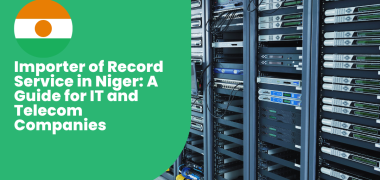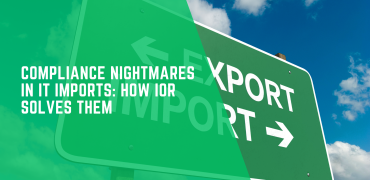Navigating the importation process in Niger can be a complex endeavor, especially for IT and telecom companies that need to ensure timely and compliant delivery of their equipment. The Importer of Record (IOR) service is a crucial solution that helps streamline this process, ensuring adherence to local regulations and customs requirements. This guide aims to provide a comprehensive overview of IOR services in Niger and how IT and telecom companies can benefit from them.
Understanding Importer of Record (IOR) Services
An Importer of Record (IOR) is a third-party entity responsible for ensuring that imported goods comply with local laws and regulations. The IOR manages all the necessary documentation, customs clearance, and tax obligations, acting on behalf of the importing company. This service is particularly beneficial for companies without a physical presence in the destination country or those unfamiliar with the local importation laws.
Key Responsibilities of an IOR
- Compliance with Local Regulations: Ensuring all imported goods meet Niger’s regulatory standards.
- Documentation Management: Handling all required import documentation, including licenses and permits.
- Customs Clearance: Facilitating the customs clearance process to avoid delays.
- Tax and Duty Payments: Managing the payment of all applicable taxes and duties.
- Record Keeping: Maintaining detailed records of the importation process for future reference and audits.
The Importance of IOR Services for IT and Telecom Companies
IT and telecom companies often deal with high-value, technologically advanced equipment that requires special handling and compliance with stringent regulations. Utilizing an IOR service can significantly reduce the risks and complexities associated with importing such equipment into Niger.
Benefits of Using IOR Services
- Regulatory Compliance: Ensures all imported equipment complies with Niger’s import regulations, reducing the risk of legal issues.
- Streamlined Process: Simplifies the importation process by handling all paperwork and customs requirements.
- Cost Efficiency: Avoids costly delays and penalties by ensuring timely and accurate compliance with local laws.
- Focus on Core Business: Allows IT and telecom companies to focus on their core operations rather than dealing with importation logistics.
- Risk Management: Minimizes the risk of non-compliance, which can lead to fines, seizures, or delays.
Navigating the Importation Process in Niger
Step 1: Pre-Importation Planning
Effective pre-importation planning is crucial for a smooth import process. This involves understanding the specific requirements for the goods being imported and ensuring all necessary documentation and approvals are in place before shipment.
Key Considerations:
- Product Classification: Accurately classifying products according to Niger’s tariff schedule.
- Import Licenses: Determining if any import licenses or permits are required.
- Documentation: Preparing all necessary documents, including commercial invoices, packing lists, and certificates of origin.
Step 2: Selecting an IOR Service Provider
Choosing the right IOR service provider is critical. Look for providers with a strong track record in handling IT and telecom equipment, and ensure they have a deep understanding of Niger’s import regulations.
Factors to Consider:
- Experience: Proven experience in handling similar imports.
- Reputation: Positive reviews and references from other clients.
- Knowledge: In-depth knowledge of local regulations and customs procedures.
- Network: Strong relationships with local customs and regulatory bodies.
Step 3: Shipment and Customs Clearance
Once the goods are shipped, the IOR service provider will handle the customs clearance process. This includes presenting the necessary documentation, paying any required duties and taxes, and ensuring the goods are released promptly.
Customs Clearance Steps:
- Document Submission: Presenting all required documents to customs authorities.
- Inspection: Undergoing any required inspections or verifications.
- Duty Payment: Paying all applicable duties and taxes.
- Release: Ensuring the goods are released from customs for delivery.
Step 4: Post-Importation Compliance
After the goods have been cleared and delivered, ongoing compliance is essential. This involves maintaining accurate records of the importation process and ensuring all regulatory requirements continue to be met.
Post-Importation Tasks:
- Record Keeping: Maintaining detailed records for audits and future reference.
- Compliance Monitoring: Regularly reviewing compliance with local regulations.
- Updates and Renewals: Staying updated on any changes in import regulations and renewing licenses or permits as needed.
Challenges and Solutions in Importing IT and Telecom Equipment
Common Challenges
- Regulatory Changes: Keeping up with frequent changes in import regulations.
- Documentation Errors: Ensuring all documents are correctly prepared and submitted.
- Customs Delays: Navigating potential delays in customs clearance.
- Tax and Duty Calculations: Accurately calculating and paying all applicable taxes and duties.
Effective Solutions
- Partner with Experienced IORs: Leveraging the expertise of experienced IOR service providers.
- Stay Informed: Regularly updating knowledge of local import regulations.
- Pre-Verify Documentation: Double-checking all documentation before submission.
- Engage with Customs Authorities: Building strong relationships with customs officials to facilitate smoother clearance.
Case Study: Successful Importation by an IT Company in Niger
To illustrate the benefits of IOR services, consider the case of a multinational IT company that successfully imported advanced networking equipment into Niger. By partnering with a reputable IOR service provider, the company was able to navigate the complex importation process efficiently and compliantly.
Key Outcomes:
- Reduced Delays: The IOR handled all customs clearance procedures, ensuring timely delivery.
- Cost Savings: Avoided potential fines and penalties through accurate compliance.
- Operational Focus: The IT company was able to concentrate on its core business activities without being bogged down by import logistics.
Conclusion
For IT and telecom companies looking to import equipment into Niger, utilizing an Importer of Record service can provide significant advantages. By ensuring compliance with local regulations, streamlining the importation process, and mitigating risks, IOR services enable companies to focus on their primary business objectives while efficiently managing their import logistics.
As Niger continues to grow and modernize its IT and telecom infrastructure, the demand for advanced equipment will only increase. By partnering with a reliable IOR service provider, companies can ensure their operations run smoothly and compliantly, positioning themselves for success in this dynamic market.




